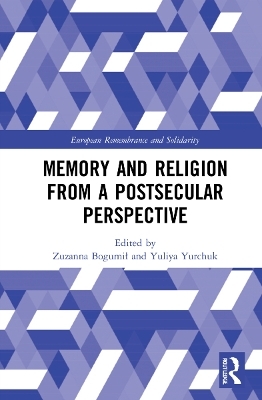
Memory and Religion from a Postsecular Perspective
Routledge (Verlag)
978-1-032-20698-1 (ISBN)
The book argues that religion is a system of significant meanings that have an impact on other systems and spheres of social life, including cultural memory.
The editors call for a postsecular turn in memory studies which would provide a more reflective and meaningful approach to the constant interplay between the religious and the secular. This opens up new perspectives on the intersection of memory and religion and helps memory scholars become more aware of the religious roots of the language they are using in their studies of memory. By drawing on examples from different parts of the world, the contributors to this volume explain how the interactions between the religious and the secular produce new memory forms and content in the heterogenous societies of the present-day world. These analyzed cases demonstrate that religion has a significant impact on cultural memory, family memory and the contemporary politics of history in secularized societies. At the same time, politics, grassroots movements and different secular agents and processes have so much influence on the formation of memory by religious actors that even religious, ecclesiastic and confessional memories are affected by the secular.
This volume is ideal for students and scholars of memory studies, religious studies and history.
Zuzanna Bogumił, PhD, works at the Institute of Archaeology and Ethnology at the Polish Academy of Sciences. Her published works include Gulag Memories: The Rediscovery and Commemoration of Russia's Repressive Past (2018) and a co-authored study titled Milieux de mémoire in Late Modernity: Local Communities, Religion, and Historical Politics (2019). Yuliya Yurchuk, PhD, teaches history at Umeå University, Sweden. She specializes in memory, the history of religion and Eastern Europe. She is the author of the book Reordering of Meaningful Worlds: Memory of the Organization of Ukrainian Nationalists and the Ukrainian Insurgent Army in Post-Soviet Ukraine (2014).
1. Introduction: Memory and Religion from a Postsecular Perspective Part 1: Memory and Religion: Theoretical Considerations 2. Religion and Collective Memory of the Last Century: General Reflections and Russian Vicissitudes 2. Sacred Religio-Secular Symbols, National Myths and Collective Memory Part 2: Postsecularity and Politics of Memory 3. The Armenian Genocide: Extermination, Memory, Sacralization 4. Building a Patrimonial Church: How the Orthodox Churches in Ukraine Use the Past 5. ‘God is in Truth, Not in Power!’: The Re-militarization of the Cult of St Alexander Nevsky in Contemporary Russian Cultural Memory 6. The Martyrdom of Jozef Tiso: The Entanglements of the Sacred and Secular in Post-War Catholic Memories 7. Remembering and Enforced Forgetting: The Dynamics of Remembering Cardinal József Mindszenty in the Cold War Decades Part 3: Post-Conflict Memories 8. Evocation and the June Fourth Tiananmen Candlelight Vigil: A Ritual-Theological Hermeneutics 9. Religious Echoes of the Donbas Conflict: The Discourses of the Christian, Muslim and Jewish Communities in Ukraine 10. Official Quests, Vernacular Answers: The Macedonian Orthodox Church – Ohrid Archbishopric (MOC-OA) as a Memory Actor in the Post-Conflict Republic of North Macedonia (2001–19) 11. Negotiating the Sacred at Non-Sites of Memory. The Religious Imaginary of Post-Genocidal Society Part 4: Media and Postsecular Memory 12. The Crimean Tatars’ Memory of Deportation and Islam 13. The Soviet Past in Contemporary Orthodox Hymnography and Iconography 14. Whose Church is It? The Nonreligious Use of Religious Architecture in Eastern Germany Part 5: Transnational and Vernacular Memories 15. The Political Use of the Cult of St Tryphon of Pechenga and Its Potential as a Bridge-Builder in the Arctic 16. ‘Vernacular’ and ‘Official’ Memories: Looking Beyond the Annual Hasidic Pilgrimages to Uman 17. Memory as a Religious Mission? Religion and Nation in Local Commemoration Practices in Contemporary Poland 18. Critical Juxtaposition in the Postwar Japanese Mnemoscape: Saint Maksymilian Kolbe of Auschwitz and the Atomic Bomb Victims of Nagasaki Afterword. From ‘Religion as a Chain of Memory’ to Memory from a Postsecular Perspective
| Erscheinungsdatum | 01.04.2022 |
|---|---|
| Reihe/Serie | European Remembrance and Solidarity |
| Zusatzinfo | 1 Tables, black and white; 1 Line drawings, black and white; 27 Halftones, black and white; 28 Illustrations, black and white |
| Verlagsort | London |
| Sprache | englisch |
| Maße | 156 x 234 mm |
| Gewicht | 453 g |
| Themenwelt | Geisteswissenschaften ► Geschichte ► Regional- / Ländergeschichte |
| Geisteswissenschaften ► Religion / Theologie | |
| Sozialwissenschaften ► Ethnologie | |
| Sozialwissenschaften ► Soziologie | |
| ISBN-10 | 1-032-20698-5 / 1032206985 |
| ISBN-13 | 978-1-032-20698-1 / 9781032206981 |
| Zustand | Neuware |
| Haben Sie eine Frage zum Produkt? |
aus dem Bereich


